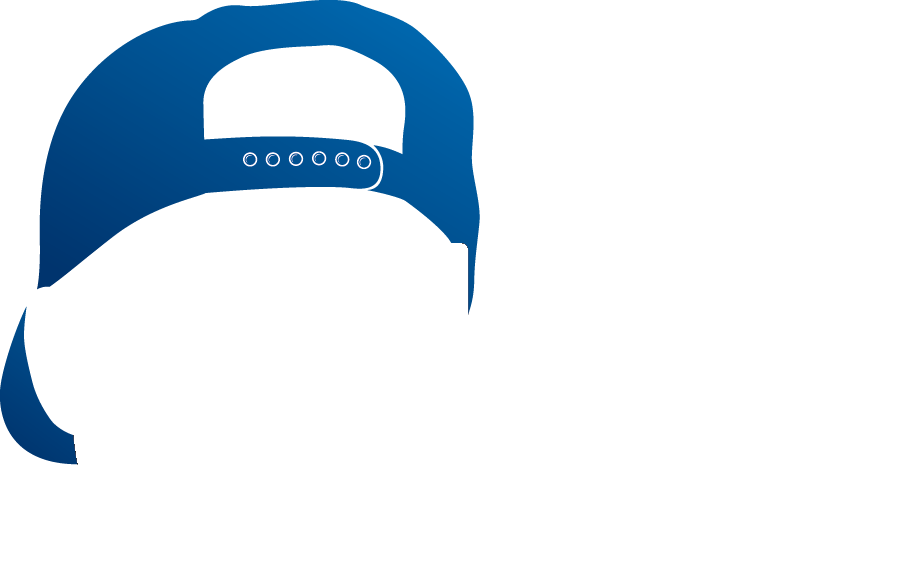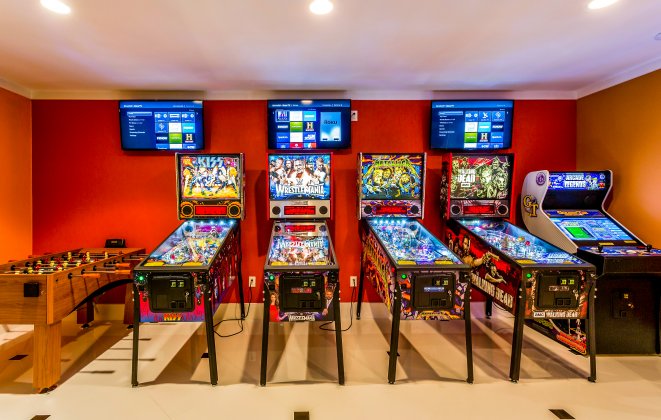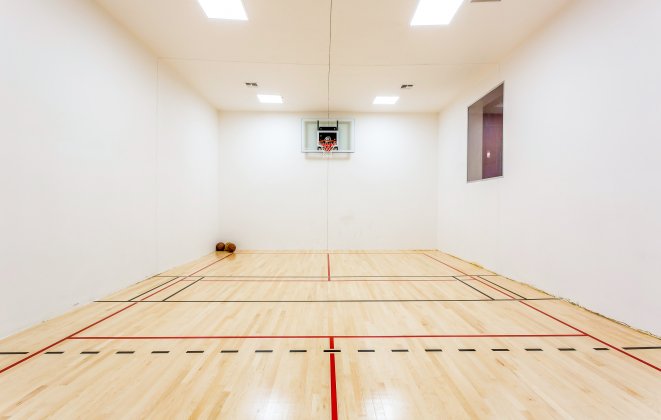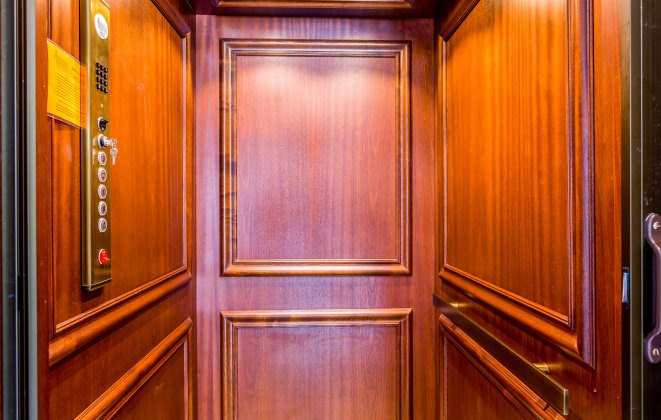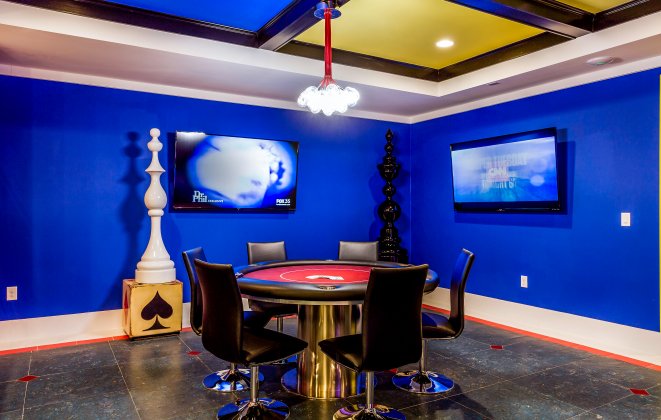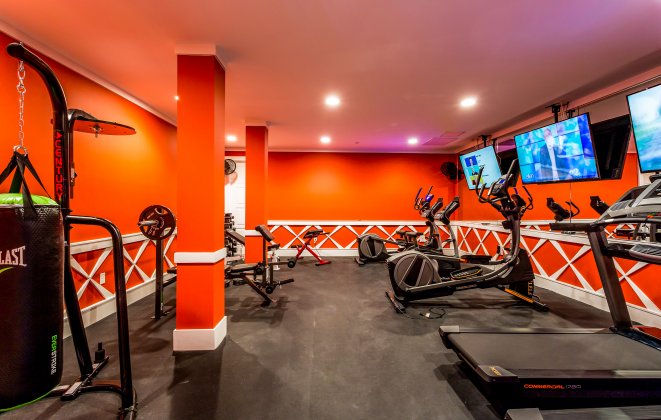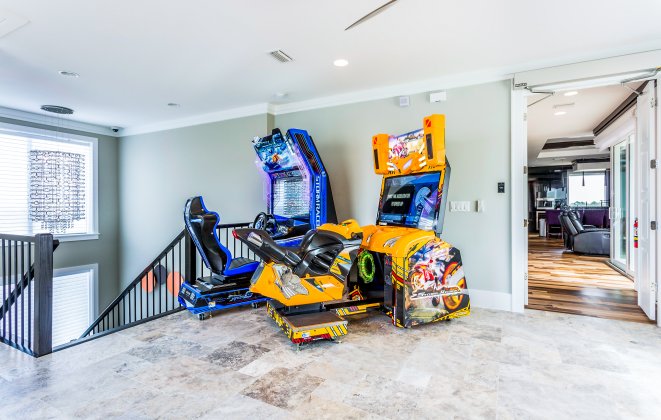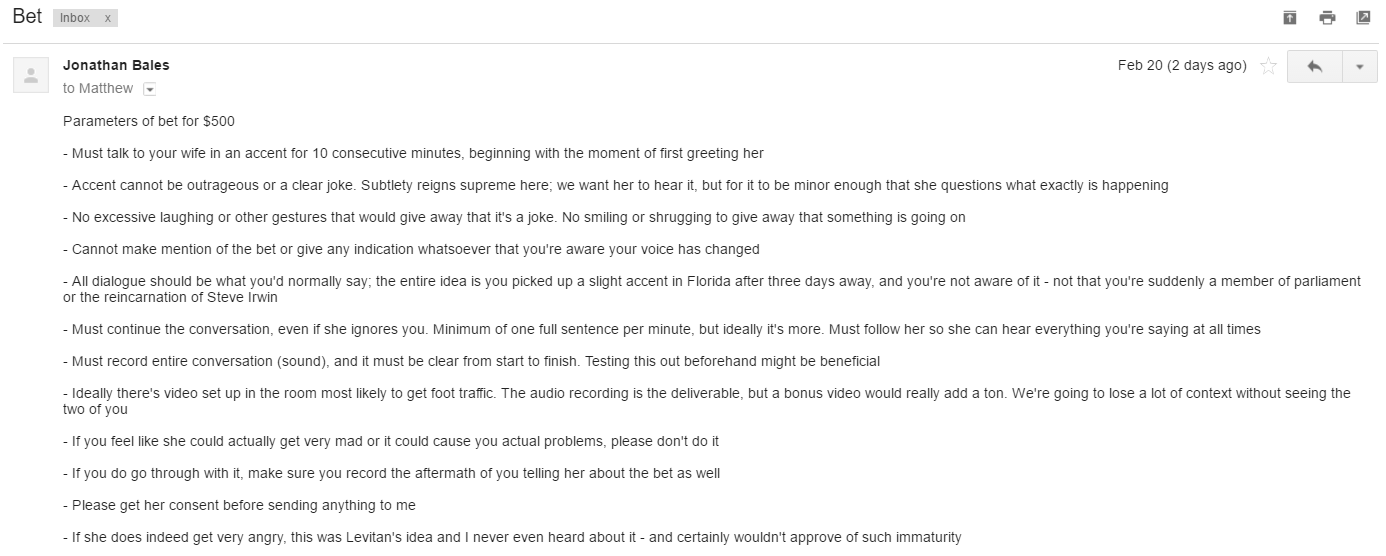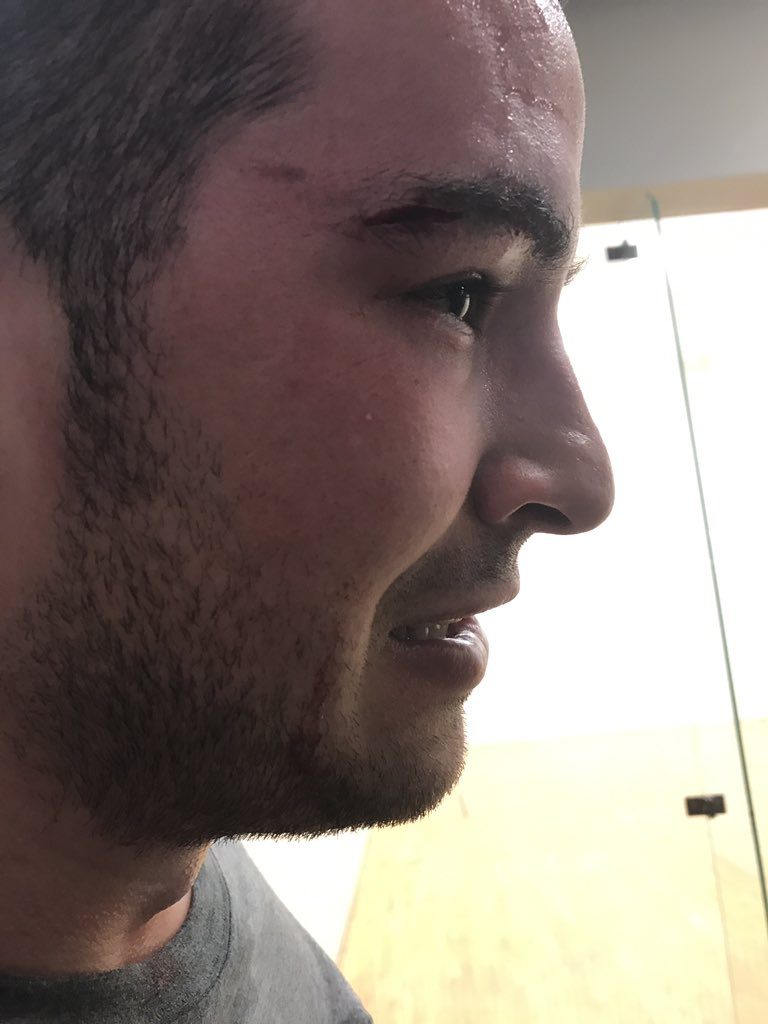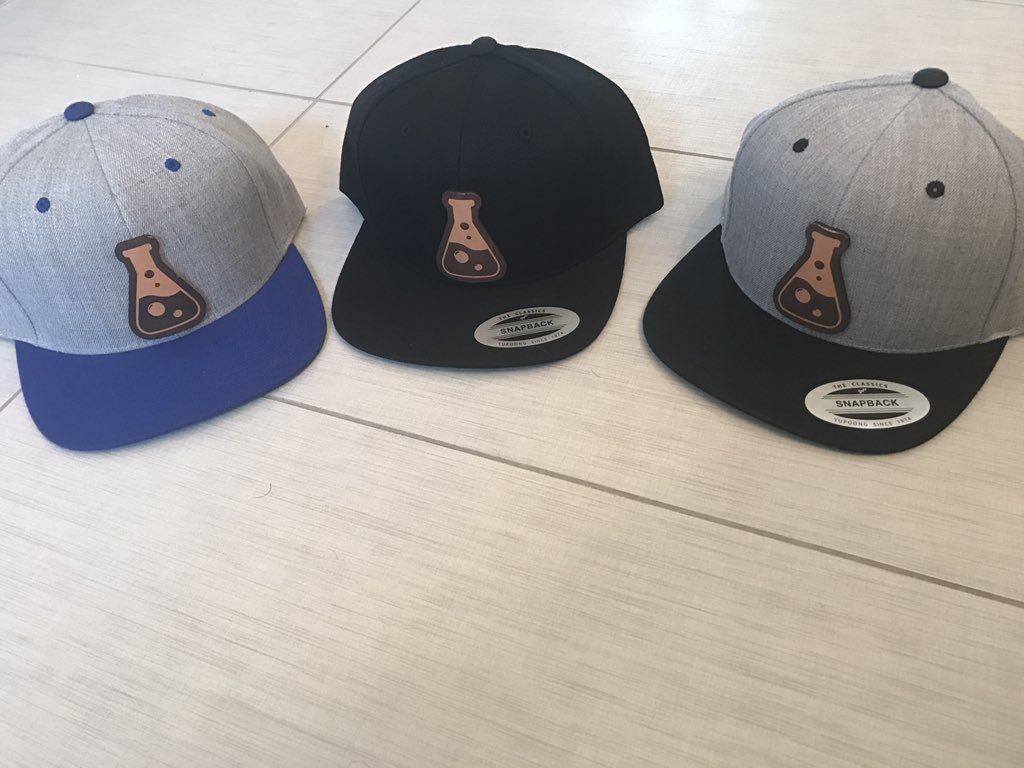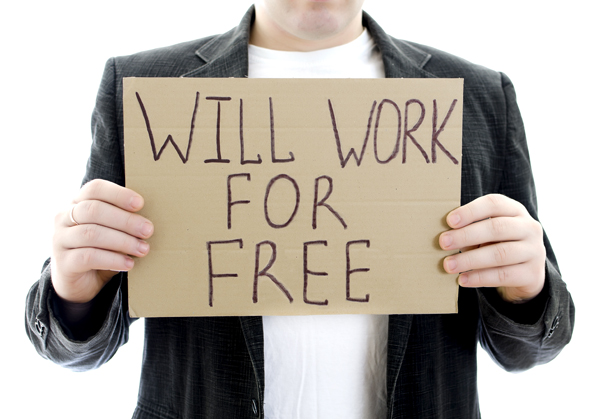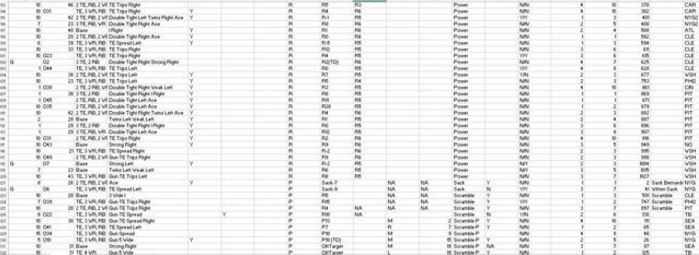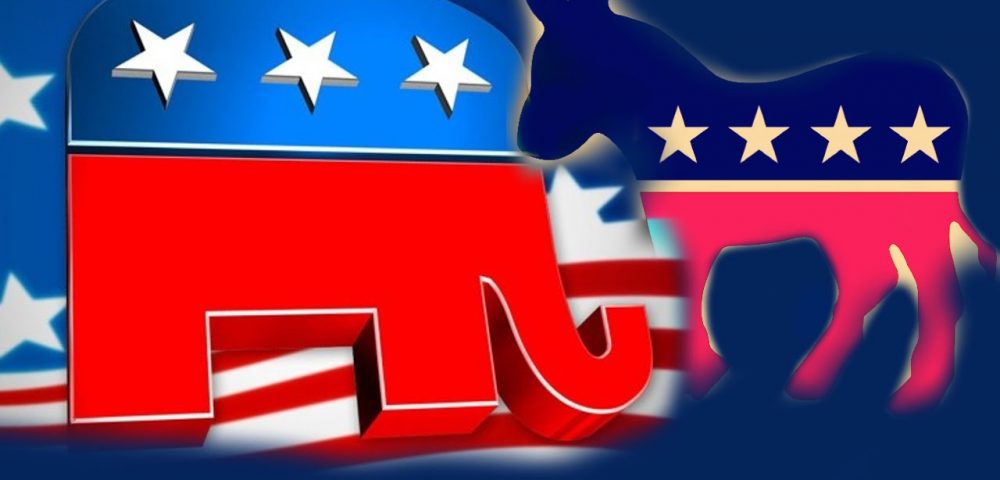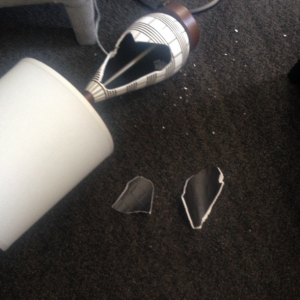Near the beginning of the year, I booked some workout prop bets with Peter Jennings and Adam Levitan. The reasoning was simple: to give us motivation to get in better shape. When your daily commute is from your bed to the living room – and many times not even that far – it makes sense to work toward the goal of not having a heart attack by age 35.
We didn’t have much time to get prepared for this – about six weeks – but decided to compete this past weekend since we’d all be in Florida for the annual FantasyLabs company trip. And what a trip it was. We went to Orlando. Why Orlando? Because apparently you can book mansions there for the same price as renting a studio in Manhattan.
The @FantasyLabs company trip pic.twitter.com/1ZvETJeeR4
— Jonathan Bales (@BalesFootball) February 19, 2017
We were initially planning a trip to Miami, but once you factor in the size of our team (16 people went to Florida) and the cost of hotels/houses, it was obvious this was actually one of the cheapest options available. Yeah, one of the cheapest options we could find had a movie theater, bowling alley, lazy river, and at least two kitchens I never even saw.
The House
I’m really big on working remotely – no commute, fewer costs, etc. – but it’s important to get the team together every so often, and this was a good place to do it.
Outside of the workout props, other highlights included:
- Dunk contest
.@FantasyLabs company retreat: Dunk contest in theater pic.twitter.com/7Jd4kxhPUm
— Sean Valukis (@svalukis) February 19, 2017
- Beating Levitan in Ms. PacMan
- Winning $4,300 in my first attempt at NASCAR DFS (definitely 100% skill, no luck whatsoever)
- Meeting a few of our employees for the first time and hanging out with the wily vets
- Peter justifying getting into the pet industry by claiming “Dogs is up 30%”
- Convincing (bribing) Freedman to talk to his wife with an accent for a full 10 minutes
The last one was an idea I had while at IHOP, which seemed like a natural place to go when you’re staying in a house with 20 pinball machines and an orange gym. On the flight home, I laid out the rules for the bet:
And Freedman delivered:
His name is matthew-freedman-6 on Venmo if you want to send your appreciation.
The Prop Bet Results
As far as the prop bets, the idea was a huge success. Even if I had lost every bet and a decent amount of money, it still would have been worth it. Both the money and the competition aspect of it were extremely motivating; all of us exercised very consistently – nearly every day – and worked harder than we ever would have without the bets. I didn’t want to lose money, but I really didn’t want to lose to Levitan and Peter. I can’t recommend enough how much of a proponent I am of using prop bets for motivation by giving yourself personal downside if you don’t work toward whatever goals you have and upside if you achieve them. Even since returning, I don’t have motivation to work out and won’t really push myself to do it until I create another challenge.
Mile run: Levitan winner (6:22), Bales 2nd (6:28)
One mile foot race between @balesfootball and @adamlevitan https://t.co/ONuqGPazg1
— Peter Jennings (@CSURAM88) February 17, 2017
The fact that over 11,000 people watched that is both awesome and disturbing. If you told me I’d run 6:28 in the mile, I’d be broke right now because I would have bet every dollar I own on winning that race. Amazing job from Levitan. If it weren’t on Periscope, I would have just stopped a little over halfway through because I could tell it was over, but I didn’t want to disappoint all the fans who tuned in to see a nail-biter.
Pullups: Bales winner (25 reps), Levitan/Peter 2nd (6 reps)
I had to go first in this event, which required the pullups to be from a complete hanging position and then all the way up with the chin above the bar. If you’ve ever done pullups, you might know the difference between a total lock-out and going 90% of the way down is substantial. I did only 15 (nearly 16) in training for this, so these results are what you’d call being a gamer. I actually didn’t know I’d win before the event, but I did know I was a lock once I got to about 15 and still felt pretty good.
Jumps (over bench, most in 2 minutes): Bales winner (95), Levitan 2nd (76)
Levitan went first in this, which was a big advantage for me. I tried to push myself at the end so we could get a realistic idea of the spread if we were to bet on it again. This exercise is sooo much harder than you might think. We had to jump off of two feet over the bench without touching it.
Bench Press: Peter winner (11 reps), Levitan 2nd (9 reps)
I was not able to compete in this because on the 10th day of training I partially tore my biceps tendon. I did 10 reps of 225 on the set before that injury. I actually couldn’t do pullups for a couple weeks, but I still trained for that by just holding myself up on the bar (from the highest possible position) and doing partial bent-over rows and other similar exercises.
Racquetball: Five stitches for Peter; Levitan and Bales big winners
I ended up winning two of my three events and would have been a mortal lock in the bench press.
My Strategy
Overall
Going in, my initial strategy was actually to lose weight. The reason for that is because lighter weight (assuming the same strength) would benefit me in everything except the bench press. Of all the events, I thought the bench press was going to be the most likely win for me and it really didn’t matter too much what I did there. Thus, if I could gain strength and lose, say, five pounds, it would help me in every other exercise.
Like I said, I tore my biceps tendon on the 10th day of the competition and had to drop out of the bench press. I was extremely incentivized to drop some weight at that point, so naturally I checked in around two pounds heavier than where I started. I think it just ended up being hard to not gain muscle from lifting weights for the first time in awhile, and I wasn’t going to force it.
The plan was to do all strength workouts until the Tuesday before the trip and all cardiovascular items up until Wednesday.
Mile
I thought I was a huge dog in this, which probably ended up being the case. On my first attempt at the mile, I had to stop. The first time I finished it in early January, it was somewhere around 9:30. That was outside and slightly up and down, but still – not good.
In terms of training, I ran a full mile only five times, I think. The way I trained for it was by instead doing sprints for as long as possible, stopping for a bit, then going again. Sprint. 30-second break. Sprint. 30-second break. And so on. The other thing I did was run up and down the stairs 50 times (up and down being one) as quickly as possible, which was my “light” training. My thinking was that I was probably so far behind that doing anything with moderate intensity wouldn’t be smart. I also wanted to improve my cardiovascular fitness more so than my muscular endurance, which was mostly fine, so I tried to really improve how long I could work at high intensity and still breathe properly.
Assuming I was an underdog heading into the race, my strategy was actually not to run as fast of a time as possible (which I was probably close to doing), but rather to get Levitan to run as slow of a mile as I could. I thought if I were near even in the final quarter-lap or so, I’d win.
To get him to run slower than he should, I figured I’d need to fuck up his pace. That was the reasoning behind firing out off the line; I wanted to get out to a lead and make him decide if he wanted to run at his pace or, preferably, try to keep up with me. He did the latter, which was good. I wanted him to think, “Oh shit, this is going to be more difficult than I thought,” and sort of freak out about how fast I was setting the pace. The first lap was around a five-minute pace – totally unsustainable.
Then my goal was to gradually slow down and hope that he’d do the same because of being more tired than he anticipated and just wanting a break. I really slowed down around the start of Lap 2. When he passed me, I died a little inside. I could tell by his form and breathing he was a huge favorite at this point. I was seriously struggling the second and third laps to keep pace. Since I set the pace so quickly, I had nothing left to give at the end. I tried sprinting full out for about three strides before my legs buckled; if I had kept going, I would have just fallen over.
Knowing his ability now, I should have let him set the pace. My only hope was to let him pick a pace that would be sustainable for me, too, and then blow by him at the end. However, without knowing he was capable of a 6:22, I actually think I did the right thing, sans perhaps going slightly too fast to start.
Nonetheless, dropping three minutes from my mile time in six weeks is a win. (Not really though since I lost the race, money, and pride.)
Pullups
Like I said, I partially tore my biceps tendon (long head) while doing the bench press in training. That injury sounds really bad, but it didn’t really hurt too much and you don’t even fucking do anything for it; just ice and let it heal. The problem is you lose all strength in your shoulder, especially with any sort of pushing movement. Even shortly after the injury, I could still do certain things and had full range of motion, but I couldn’t do a pushup or hang all the way down on the pullup bar without pain, so I adapted the training to instead hold myself at the top for as long as possible. I also did bent-over rows and Superman extensions (idk what these are really called?). I could do full pullups again around two weeks before heading to Florida, so I went absolutely nuts training for this at that point. I mostly used an overhand grip because that’s what we did in the competition, but I occasionally worked in neutral and underhand (much easier).
With every exercise, I experimented with different approaches and tracked the results. With pullups, you can pull yourself up more with your mid-back (sort of leaning back), your arms, your delts, etc. I found the most success just going straight up and down, primarily because we had to put our chins above the bar, but also because that allowed for the best rhythm and no rocking. My rhythm during the actual event was perfect.
I started at nine pullups and had to beat Levitan by seven and Peter by six. No idea how I got 25. I tried it again this morning and got 17. This is another reason I’m really high on competition versus goal-setting as a means of improving. If I had faced a challenge of increasing my pullups from nine to 25 in six weeks, I would have assumed that’s not possible and I wouldn’t even do it. If it were just me competing against myself to reach 15 reps, let’s say, I also never would have been able to get to 25. Competing without knowing the status of the opponents was really the only way to push myself to a near-optimal level.
Jumps
I made up this exercise, which I thought would be a really nice combination of leg strength and endurance. Go ahead and try to jump over a bench for two minutes straight. I got 51 in my first attempt.
I tested a lot of different styles with this: starting as fast as possible, pacing myself, double-jumps, jumping from different angles, taking five-second breaks at different intervals, etc.
I basically found that it didn’t really matter all that much what I did. Since I started not being able to jump for two straight minutes, I would always be around the high-50s no matter what I did.
Like the mile, though, my strategy was to start fast while training – not 100%, but close – and gradually extend how long I could maintain that high speed. That worked really well, and I jumped non-stop during the actual competition. Levitan came out FIRING with like 45 jumps in the first 45 seconds or something insane, but then he died. Every time he stopped for a few seconds, I got so happy. Not that I wasn’t rooting for my friend, but I wanted him to lose so bad and for it to crush him mentally and send him into a downward spiral so bad it’d take months or even years from which to recover. That’s a joke, but I definitely had to win this. I hadn’t beaten his 76 jumps at all while training, but my max was 74 while training, so I figured I could get there with everything on the line.
By the way, one thing that’s interesting is how little we actually push ourselves compared to what we can really do. I truly tried as hard as I could to do these jumps and couldn’t get more than 74, yet got 95 in Florida and maybe could have been above 100 if necessary. The difference in how my muscles felt was so extreme; after all three exercises, I felt like I had done an entire workout. It really reinforced the idea that if you want unbelievable results, you should create incentives you know will entice you to do things you’d otherwise be physically and mentally incapable of doing.
Bench Press
This was a lock. In hindsight, my only goal should have been “don’t get injured.” I was training with 235 pounds instead of 225. I was fully warmed up when the injury occurred, so I’m not really sure what I could do differently here. I do think there’s maybe some merit in using dumbbells over a barbell as it relates to injury prevention, but not for this competition.
Racquetball
Levitan and I joined a gym that has racquetball courts here in Philly, so we were able to play a bunch and will continue to do that in the future. I’d say the biggest improvements I made didn’t come in playing, but just in watching YouTube videos of guys like Rocky Carson (we have Rocky Carson racquets now, nbd). It really sped up the learning curve to figure out where pros serve, for example. Obviously that will change as I’m comfortable knowing where I should hit each shot.
Diet
Ate a Dunkin’ sausage, egg & cheese on a croissant the morning of the mile. Read: no change to diet.
New Labs Hats

